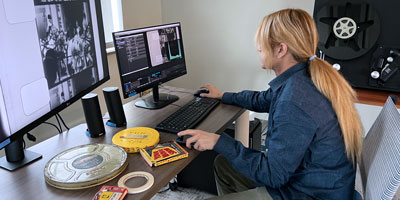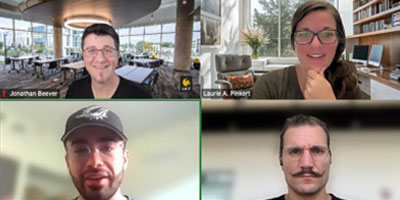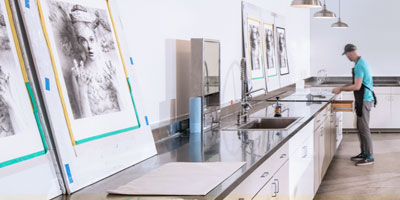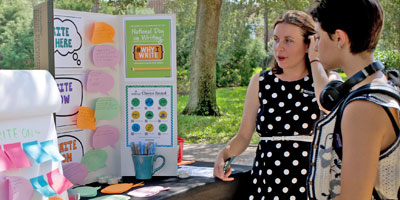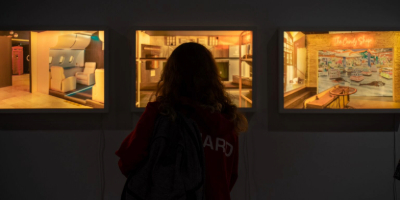At the College of Arts and Humanities, research is both scholarly and creative — spanning disciplines, challenging boundaries, and shaping culture. Our faculty and students explore the human experience through critical inquiry, artistic expression, and interdisciplinary collaboration.
In order to answer society’s biggest questions, we need to look across disciplines.”
Featured Research
Digital Humanities
Digital Humanities combines the use of digital tools and methods with the study of the humanities, bridging the university’s strengths in technology with its commitment to human-centered research and innovation. Digital humanities use tools like data visualization, text mining, GIS mapping and digital archiving to explore culture, history, language and identity in new and impactful ways. This work preserves and interprets cultural heritage, while making it more accessible and engaging to broader audiences.
At UCF, digital humanities foster interdisciplinary collaboration between the arts, humanities, and STEM fields. They support public-facing scholarship, attract external funding and prepare students to think critically and creatively in a digital world.
Example: PRINT - About
AI and Emerging Technology
Our arts and humanities scholars are engaging in critical and creative conversations around artificial intelligence and emerging technologies. These tools are rapidly reshaping how we create, communicate and understand the world. Our disciplines bring essential perspectives to questions about ethics, creativity, identity and the human experience — areas that are often overlooked in purely technical approaches.
At UCF, where innovation is a core value, our work helps ensure that technological development is guided by cultural insight, historical context and ethical reflection. By engaging with emerging technologies, our scholars expand the boundaries of their disciplines and contribute to shaping a more thoughtful and responsible digital future.
Example: Johnson, Emily K., and Anastasia Salter. Critical Making in the Age of AI. Amherst College Press, 2025. ISBN 978-1-943208-96-8 (Open Access).
https://services.publishing.umich.edu/Books/C/Critical-Making-in-the-Age-of-AI3
Immersive Experiences and Themed Entertainment
If you want to study Broadway, go to New York. If you want to study country or Christian music, head to Nashville. Films? Be in LA or Georgia. But if you are interested in themed experiences, Central Florida – the Theme Park Capital of the World – is the only place to be.
Central Florida is the global leader in immersive storytelling and themed entertainment, and UCF plays a central role in this space. Faculty and students engage in research that blends performance, design, narrative and technology to create transformative experiences. Through partnerships with industry leaders and interdisciplinary programs like themed experience and immersive experience design, the college contributes to the evolution of experience and entertainment innovation.
Example: Baker, Carissa. 2024. “Three-Dimensional Fear: The Presence of Narrative in Theme Park Halloween Festivals.” Event Management 28 (4): 631–47.
Cultural and Historical Studies
Our faculty and students conduct innovative, interdisciplinary research that explores past and present human experience through digital archives, oral histories and cultural analysis. This work not only preserves vital aspects of our shared heritage, but also generates new knowledge that informs national and global conversations. It attracts competitive grants, supports high-impact publications and strengthens our reputation as a hub for meaningful, socially engaged research.
Our commitment to cultural and historic research also drives collaboration beyond the university. By investing in this work, we demonstrate the value of the humanities in shaping public understanding, influencing policy and ensuring that voices and stories are preserved for future generations.
Creative Writing and Literary Studies
Storytelling is at the heart of how we communicate meaning, explore identity and imagine the future — and it is a skill that is increasingly vital in our digital age and in fields like AI, gaming, virtual reality and digital media. Literary scholars and creative writers bring critical insight into how language, culture and imagination influence the technologies we build and the societies they transform.
By supporting research in these areas, UCF fosters interdisciplinary collaboration that enriches both the humanities and STEM. Creative writing and literary studies help humanize technology, challenge assumptions and ensure that innovation is guided by empathy, ethics and cultural awareness. In a world driven by data and code, these fields remind us why stories — and the people behind them — still matter.
Example:The Florida Review at UCF
Philosophy and Ethics
Philosophy and ethics provide the framework for responsible innovation. As emerging technologies like artificial intelligence, biotechnology and data systems reshape society, ethical inquiry helps us navigate questions of privacy, equity, accountability and human impact. Philosophy equips students and researchers with tools to think rigorously about what we create…and why.
At UCF, where technological advancement is a core strength, research in philosophy and ethics ensures that innovation is grounded in human values. It fosters interdisciplinary collaboration, informs policy and prepares students to become thoughtful leaders who can anticipate and address the broader consequences of their work.
Example: Ethically Speaking Ethically Speaking - UCF Center for Ethics
Visual and Performing Arts
Our scholars engage in critical and creative conversations the arts as powerful forces shaping culture, identity and innovation. In Orlando, a city known globally for its innovative approaches to hospitality, tourism and entertainment, our faculty and students explore how these economic drivers intersect with technology, storytelling, and community impact. This work reflects and contributes to a thriving creative economy that blends artistic vision with innovation.
Example: UCF Celebrates the Arts
https://www.cfpublic.org/podcast/spotlight/2025-04-10/spotlight-ucf-celebrates-the-arts-elevates-collaboration-of-arts-and-tech
Linguistics and Language Studies
At UCF, where innovation and interdisciplinary research are central, language studies connect the humanities with fields like AI, machine learning, cognitive science and digital media. This research supports everything from improving voice recognition systems to designing culturally aware user interfaces, ensuring that technological advancement is grounded in a deep understanding of human expression and interaction. Language studies also help us analyze how meaning is constructed, how narratives shape public discourse, and how linguistic diversity impacts access to information and opportunity.
Example: ELLE Elle 2.0
Public History and Community Engagement
Public history and community engagement research at UCF is especially impactful because of Central Florida’s unique cultural and demographic landscape. As one of the fastest-growing regions in the country, Orlando offers a living laboratory for exploring how history is remembered, shared and shaped by communities. From its rich civil rights legacy to its vibrant immigrant populations and evolving urban identity, the city provides countless opportunities for students and researchers to collaborate with local organizations, museums and neighborhoods. We partner with community organizations like the Orange County Regional History Center and the Preserve Eatonville Community to create projects that are academically rigorous and publicly accessible, allowing the university to investigate contemporary issues — such as migration, social structure and community — through a historical and cultural lens.
At a university like UCF, where innovation and public service go hand in hand, public history research helps bridge the gap between the past and the present, and between the university and the people it serves.
Example: RICHES™
Arts and Wellness
At a university like UCF, known for its strengths in technology and innovation, arts and wellness research adds a vital human dimension. It fosters collaboration across disciplines, leading to creative solutions like using digital twin technology to aid in stage fright or animations to provide healthcare advice to multilingual communities. This research also helps students and faculty design with empathy, not just efficiency, and supports student well-being and community engagement. Orlando, in particular, offers a unique environment for this work. As a diverse, rapidly growing city with a strong healthcare sector, vibrant arts scene and major entertainment and tech industries, it provides rich opportunities for real-world partnerships and impact. By focusing on arts and wellness, UCF is preparing graduates who are not only technically skilled but also creative, adaptable and ready to lead in a world that values both innovation and empathy.
Example:Pabst Steinmetz Foundation Arts & Wellness Innovation Awards - College of Arts and Humanities
Centers, Institutes and Labs
The UCF College of Arts and Humanities is home to a vibrant network of research centers and creative studios that foster a culture of curiosity, collaboration and community engagement. From digital scholarship and ethical inquiry to fine arts and writing excellence, these centers provide students and faculty with the tools, space and support to explore big ideas and make meaningful impact. Center for Research and Education in Arts, Technology & Entertainment
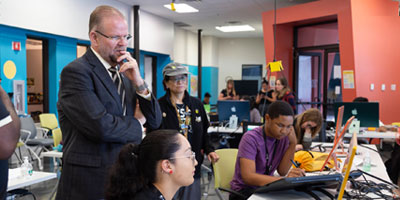
Faculty Research and Creative Projects
Our faculty lead groundbreaking research and creative projects supported by national and international grants, fellowships and awards. Their work incorporates traditional scholarship, innovative technology and experimental forms of creative expression.
Student Research Opportunities
Students at all levels are encouraged to participate in research through thesis projects, assistantships, internships and showcases. The college supports student inquiry through mentorship, funding and collaboration with the Office of Undergraduate Research.
Funding and Support
The college offers support for grant writing, research development and internal funding opportunities to help our researchers bring their ideas to life.
Get Involved
Whether you’re a prospective student, community partner or fellow researcher, we invite you to connect with us. Reach out to the Associate Dean for Research or directly to our faculty to learn more about collaboration opportunities.
Integration of
AI and Emerging Technology
The College of Arts and Humanities is leading critical and creative conversations around artificial intelligence and emerging technologies. Our faculty and students are exploring how these tools are reshaping communication, creativity, ethics and the human experience.
From AI-generated art and storytelling to the ethical implications of machine learning and algorithmic bias, research in this area spans disciplines and challenges conventional boundaries. Scholars in philosophy, writing studies, digital media and the arts are collaborating on projects that examine how AI intersects with identity, equity, authorship and innovation.
The college is also a key partner in university-wide initiatives such as AI for All, contributing expertise in AI literacy, ethics, and responsible use. Faculty are involved in NSF-funded research on AI in education, the development of ethics modules for computer science courses and the design of accessible XR (extended reality) platforms.
Through public programming, interdisciplinary research, and classroom innovation, we are helping shape a future where emerging technologies are used thoughtfully, creatively and ethically.
Publications and Exhibitions
Explore recent books, articles, performances, exhibitions and digital projects produced by our faculty. These works reflect the diversity and impact of research across the college.
Bill Fogarty
Forthcoming "Plath's Sounds." The Routledge Companion to Sylvia Plath. Routledge, 2026.
Chiara Mazzucchelli
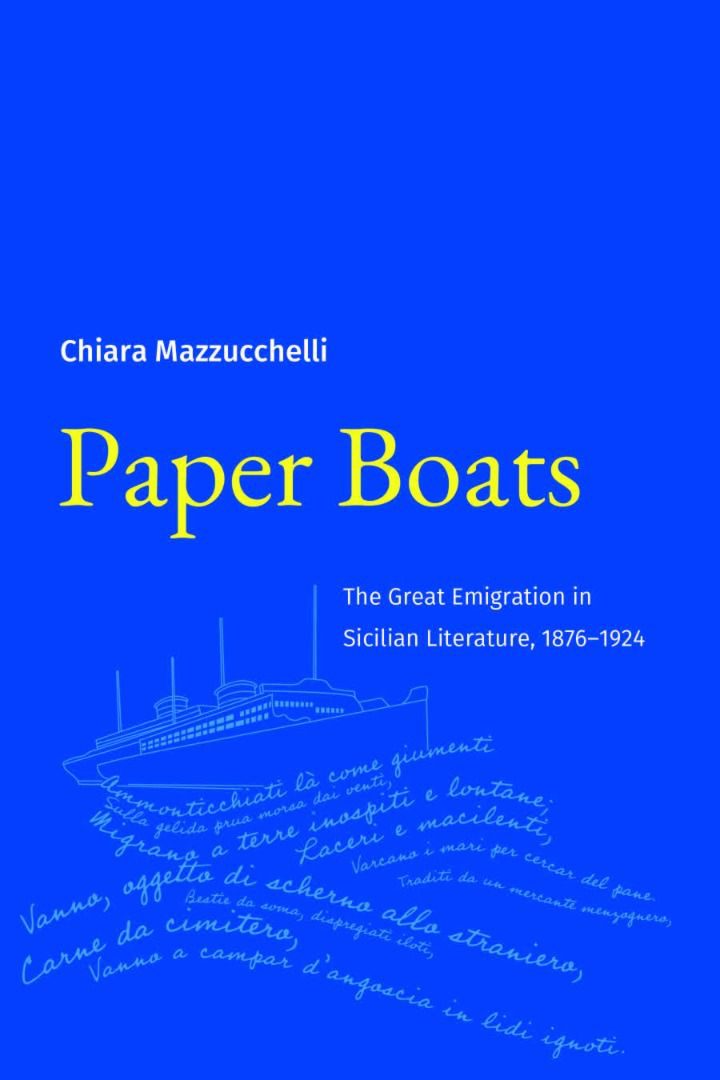

Forthcoming Paper Boats. The Great Emigration in Sicilian Literature. SUNY Press, 2026.
Tiffany Earley-Spadoni
2026. Earley-Spadoni, T. "Towers Built upon the Mountain Peaks: Communicating at the Speed of Light in the Ancient Near East." In Sending the Message: Beacons and Military Communication from Antiquity to Early Modern Times, edited by Marie Ødegaard, Stuart Brooks, Thorsten Lemm, and Frode Iverson. Brill.
Shelley M Park
Forthcoming Shelley M. Park. "Queer Mothering: Contested Identities and Practices." In Sarah La Chance Adams and Caroline Lundquist, eds., Handbook of Philosophies of Pregnancy, Childbirth, and Mothering (Palgrave MacMillan).
Keri Watson
Watson, Keri. “Barefoot Boys and Smiling Girls: Re-Reading Eudora Welty’s Photographs of Childhood." Eudora Welty Review 17 (2025): 101–150.
Pamela Baker


Baker, Pamela. “What the Girl Could Feel.” (nonfiction). Gulf Coast: A Journal of Literature and Fine Arts 38.1 (Winter/Spring 2026). Print.

